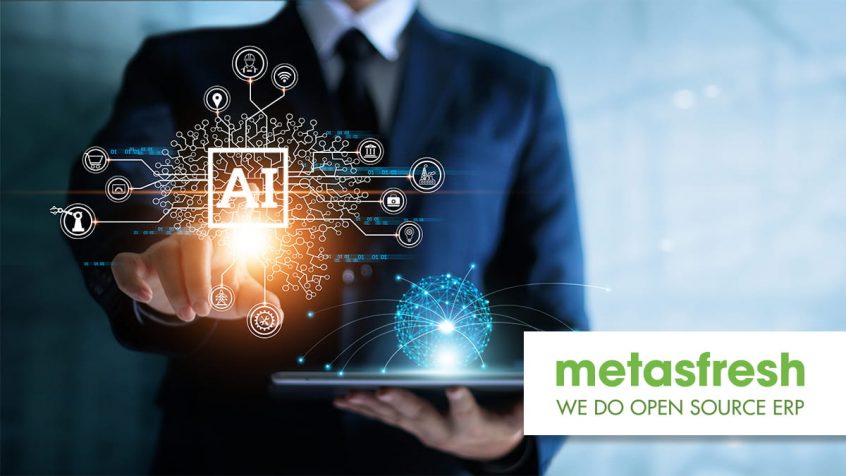Share this Post
Artificial intelligence. It’s everywhere. As Shanhong Liu, research expert for the global software industry, writes in a report for Statista: “AI, once the subject of people’s imaginations and main plot of science fiction movies for decades, is no longer a piece of fiction, but rather commonplace among people’s daily lives whether they realise it or not.”
It’s true — and has been true for some time already. As far back as 2018, nearly 9 in 10 consumers were using at least one of the following six devices, programs or services that featured elements of artificial intelligence, according to a Gallup consumer survey.
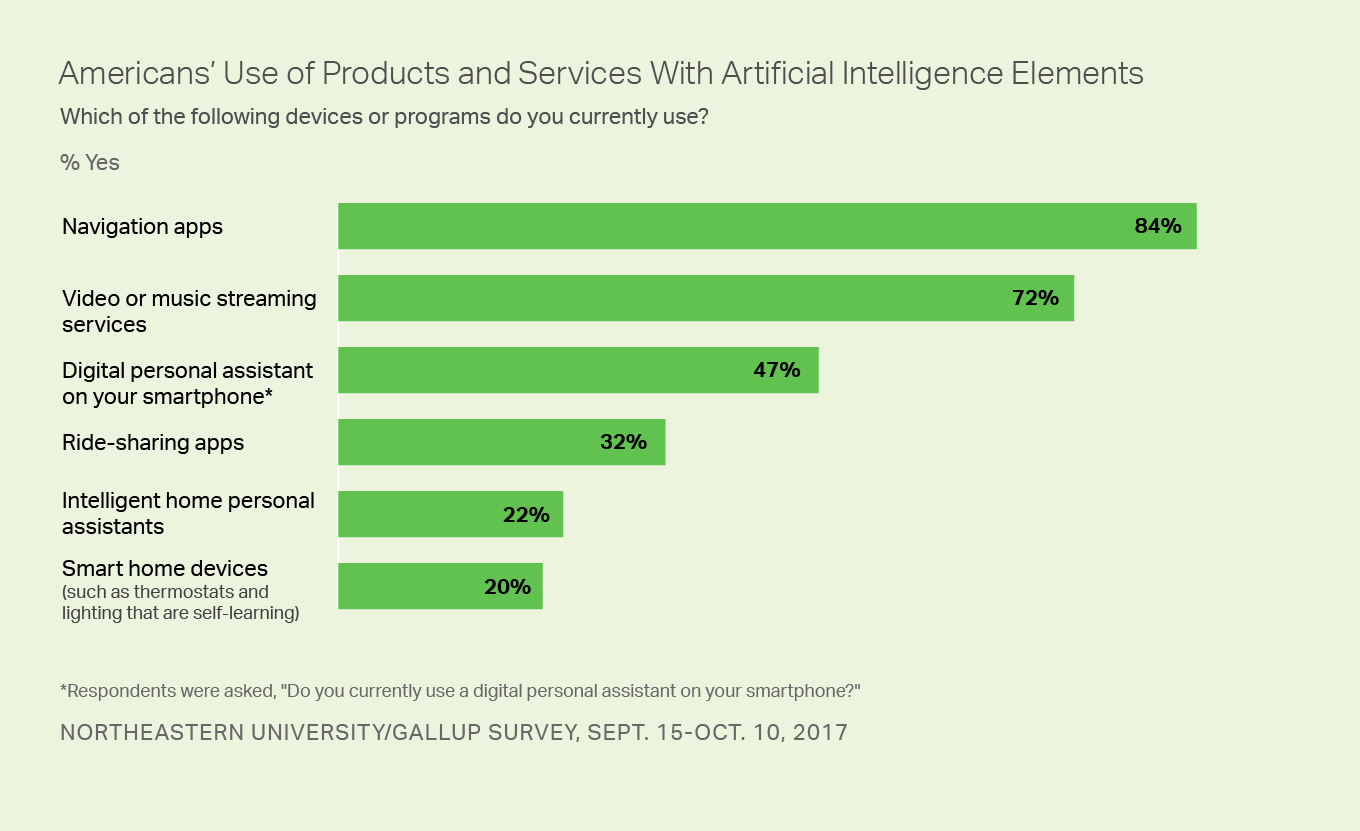
Americans‘ use of products and services with AI elements. —Source: gallup.com
Since then, adoption of all six has risen even further — 89% of people now use on-demand streaming services, for example, 51% use a voice-operated personal assistant on their smartphones, while 69% of households now have at least one smart home device.
And it’s not just in the consumer world where AI is making an impact. Artificial intelligence is transforming the business landscape, too. As Liu goes on to explain: “AI refers to the ability of a computer or machine to mimic the competencies of the human mind, which often learns from previous experiences to understand and respond to language, decisions, and problems. These AI capabilities, such as computer vision and conversational interfaces, have become embedded throughout various industries’ standard business processes. The industries that have become prominent for AI adoption in organisations include high tech and telecommunications, financial services, and healthcare and pharmaceutical.”
Machine learning, for example — a subset of AI that enables computer systems to automatically learn and improve from experience without being explicitly programmed — is being increasingly deployed for business purposes. Machine learning algorithms are being utilised in all types of businesses in practically every industry to process large amounts of data quicker and with greater accuracy than a human being could ever dream of achieving.
For example, banks and financial institutions rely on AI/ML systems to automate credit assessments and fraud detection. Cybersecurity teams are using machine learning to monitor systems and networks, detect threats and anomalies, and respond to potential attacks. And from chatbots to marketing automation technologies and self-driving delivery vehicles — AI is indeed permeating practically every industry, and many believe the technology will eventually prove to be bigger than even the internet revolution.
Already, 50% of companies have adopted AI in at least one business function, while over the next year, AI/ML technologies are slated to be the top investment to fuel digital business goals, according to a new report by IDG.
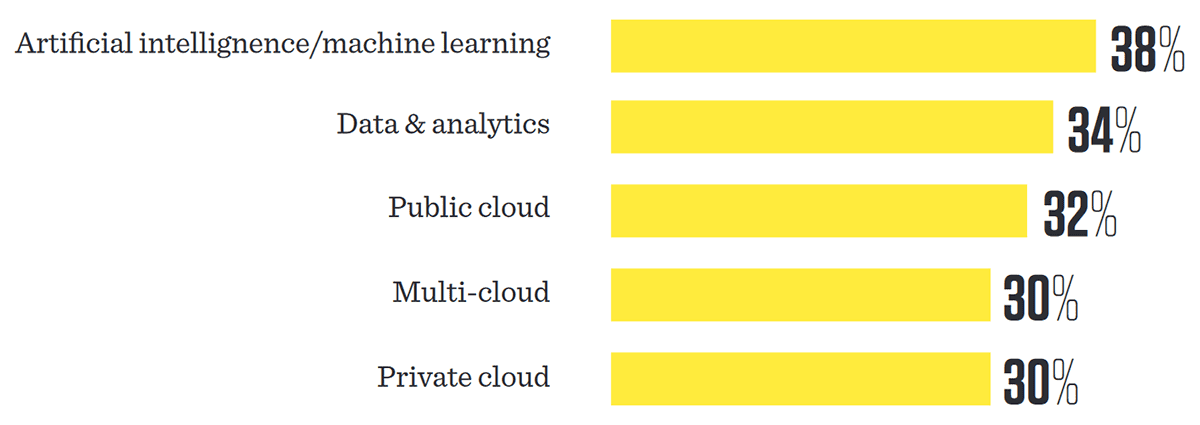
Investing more in these technologies to become a digital business. —Source: idg.com
But what about the impact of AI in the future? How will the growing prevalence of the technology change both the business and consumer landscape over the coming years?
Let’s take a look at some of the things we can expect from artificial intelligence in the years to come and its transformational impact on our lives, businesses, and industries.
Will AI Replace Human Jobs?
The robots are coming for your job.
We’ve heard it hundreds of times — but is it true? Well, it depends on the nature of the job in question, and how far ahead into the future we look.
As of a 2020 report by Statista, 54% of business and HR leaders worldwide claim they expect AI will have an impact on the nature of jobs in their organisation over the next three years — though they believe the number of jobs will remain the same. 25%, however, believe that AI will create a net decrease in jobs — while 12% believe AI will result in an increase.
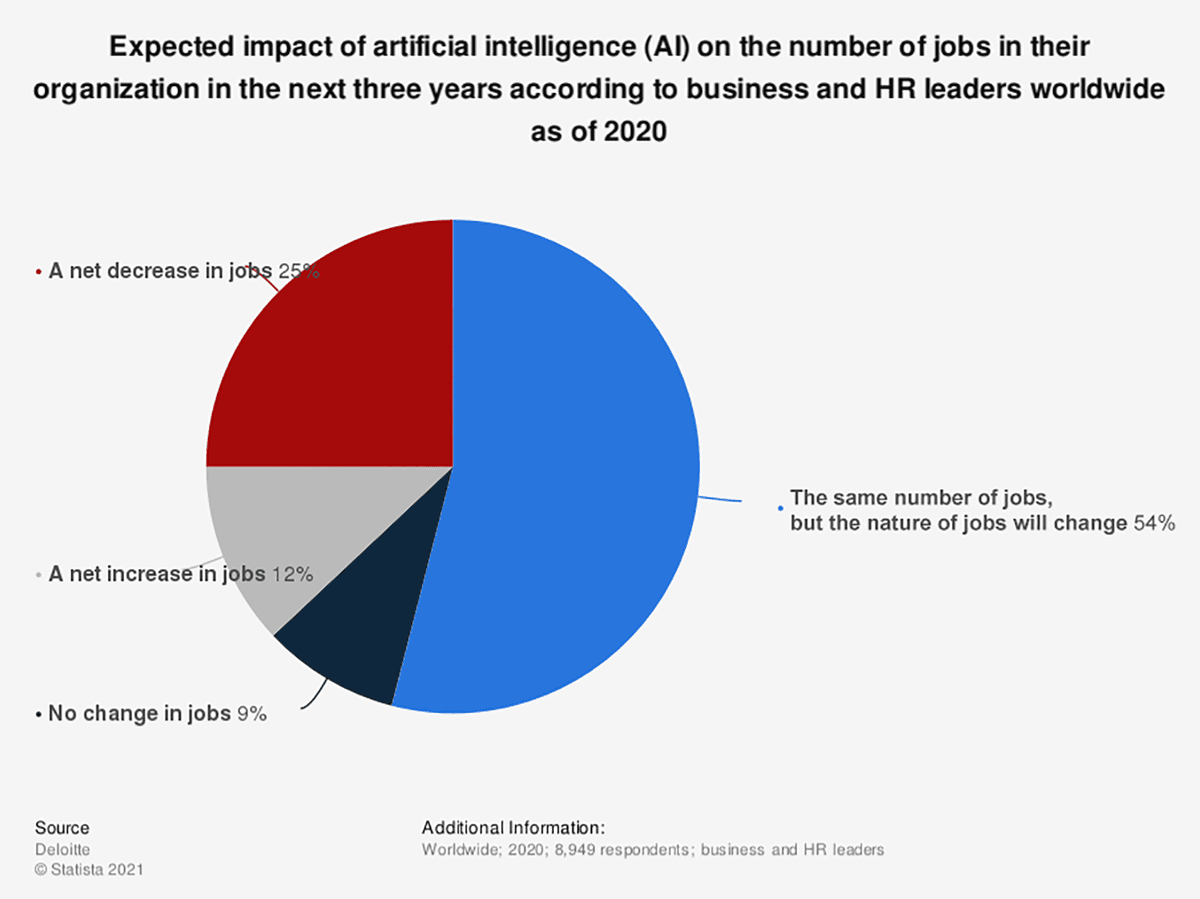
Expected impact of artificial intelligence (AI) on the number of jobs. —Source: statista.com
Looking slightly further ahead, a report from the World Economic Forum (WEF) suggests that emerging technology adoption by companies will transform tasks, jobs, and skills by 2025. 43% of businesses surveyed indicated that they are set to reduce their workforce due to technology and AI integration — compared to 34% that plan to expand it.
As such, employers expect that by 2025, “increasingly redundant roles” (see Figure 22 below) will decline from being 15.4% of the workforce to 9% (a 6.4% decline). However, emerging professions — i.e., those that will become newly enabled by emerging technologies (things like process automation specialists and IoT specialists, for example) — will grow from 7.8% to 13.5% (5.7% growth).
In all, the WEF estimates that while, by 2025, 85 million jobs may be displaced by a shift in the division of labour between humans and machines, 97 million new roles may emerge that are more adapted to the new division of labour between humans, machines, and algorithms — a 12 million net increase of jobs.

Top 20 job roles in increasing and decreasing demand across industries. —Source: weforum.org
Ultimately, as AI proliferates, the impact on the job market will become increasingly significant — particularly on lower-skilled jobs. As author, computer scientist, and AI expert Kai-Fu Lee put it in a recent lecture at Northwestern University: “The bottom 90 percent, especially the bottom 50 percent of the world in terms of income or education, will be badly hurt with job displacement. […] The simple question to ask is, ‘How routine is a job?’ And that is how likely [it is] a job will be replaced by AI, because AI can, within the routine task, learn to optimise itself. And the more quantitative, the more objective the job is — separating things into bins, washing dishes, picking fruits, and answering customer service calls — those are very much scripted tasks that are repetitive and routine in nature. In the matter of five, 10 or 15 years, they will be displaced by AI.”
AI in Healthcare
While science fiction writers and filmmakers like to portray a dystopian future where super-intelligent machines take over the world and enslave or eradicate humanity, the truth is that the type of AI (known as artificial general intelligence or AGI) that would be capable of such a task may not ever even be possible to create — and it’s certainly many, many decades away if it is.
A more likely scenario — and one that is already playing out in practice — is that human beings will increasingly harness the tremendous power of AI, ML, and deep learning (DL) technologies to save human lives, not destroy them.
For example, as reported in a Built In article, in 2015, misdiagnosing illness and medical error accounted for 10% of all deaths in the US. Immune to human error, and with the ability to process thousands and thousands of data points faster and more accurately than us mere mortals could ever dream of, AI can predict and diagnose disease far more effectively and efficiently than most medical professionals.
In a peer-reviewed study last year, authored by researchers from Babylon Health and University College London, it was found that causal machine learning models now exceed the diagnosis accuracy of human doctors. The research found that the ML model used in the study scored higher than 72% of general practitioner doctors when tasked with diagnosing written test cases of realistic illnesses.
Elsewhere, AI is being used to speed up drug discovery, improve early detection of diseases like cancer and Alzheimer’s, and develop precision medicines that may one day revolutionise healthcare to the point where we are each given unique, personalised drugs and treatments — as opposed to today’s one-drug-fits all model.
AI in Manufacturing
AI will impact the future of manufacturing in a big way. As a report for IT Pro reveals, AI is fuelling huge change for the manufacturing industry with numerous use cases for the technology to optimise operations. From predictive and prescriptive machine maintenance (where sensors are used to spot equipment errors before they occur and thereby reduce downtime), to reducing waste in the supply chain, and predicting what products consumers will want or need so they can be made ready for sale without delay — AI will have a huge impact on the industry as the technology develops.
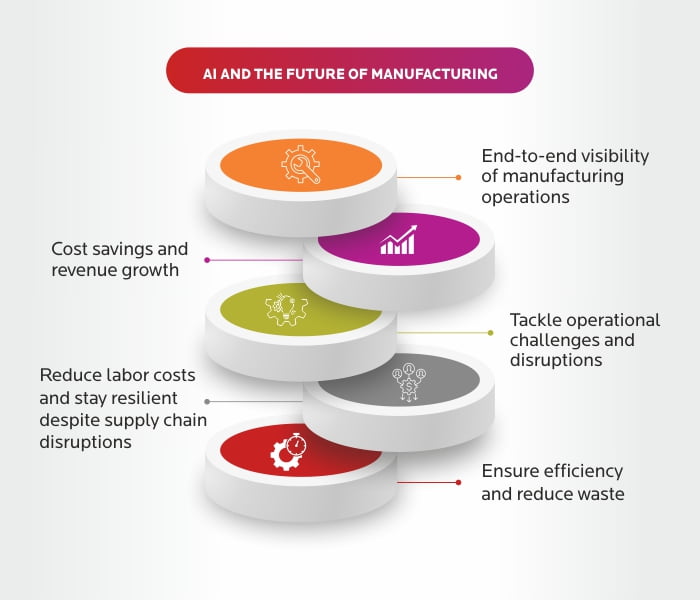
AI and the Future of Manufacturing. —Source: birlasoft.com
This will all be hugely beneficial for manufacturers. Indeed, according to McKinsey, companies using AI witness cost savings and revenue growth — 16% of those surveyed recorded a 10-19% decrease in costs, and 18% saw a 6-10% increase in overall revenue.
AI systems also enable predictive analytics, which helps tackle operational challenges and disruptions to both supply chains and the workforce. A separate report from McKinsey found that AI can improve forecasting accuracy in manufacturing by 10-20%, translating to a 5% in reduction in inventory costs and a 2-3% increase in revenues.
Talking to IT Pro, Ian Hughes, Director of Service Solutions at global food packaging and solutions giant Tetra Pak, explains that the company is already helping many of its customers in food and beverage manufacturing implement AI into their operations.
„Factory operations are becoming increasingly digitised through the use of software tools, amassing a lot of information that needs to be processed, evaluated and understood,” said Hughes. “AI gives users the opportunity to sift through all this unconnected, unstructured data and make sense of it. By analysing specific data points such as capacity utilisation rates or electricity consumption, manufacturers can drive a leaner operation, increasing performance while lowering their costs and carbon footprint.“
He adds: „AI is already helping manufacturers become more flexible in the production process. By using data insights from the sales funnel, factories can better predict customers‘ needs and therefore customise production in line with consumer trends. By achieving the right balance between the use of digital tools and human analysis, factories could minimise their losses such as time, resources, material, and adopt a zero waste mindset.
„We’re already using algorithms to help us find ways to reuse, refine and reengineer our customers‘ products that expand their life expectancy. I’m excited to see how manufacturers adopt AI to continue engaging with their product holistically and better support a circular economy.“
AI in Retail
AI will also revolutionise retail — in both the online and offline realms.
Predictive analytics will play an increasing role for brick-and-mortar and ecommerce merchants, utilising machine learning and other data analysis techniques to transform raw data into insight for the most important piece of information in the industry — consumer behaviour.
This knowledge can support many actions and important decisions — from enhancing supply chain and inventory management, to conducting competitive research, monitoring pricing trends, predicting product demand, understanding return rates, dealing with ecommerce fraud, and analysing the market to improve marketing and advertising campaigns.
Traditional brick-and-mortar retail will also be hugely transformed — and Amazon is leading the way.
The company first introduced its Just Walk Out technology in a single Amazon Go grocery store in December 2016 — and it was truly ground-breaking. Using a network of cameras to track shoppers’ movements around the store and weight sensors on shelves to detect what items they pop in their baskets, Amazon then uses computer vision, AI, and deep learning to accurately match the items shoppers have picked up, so no additional scanning is needed. Instead, shoppers “Just Walk Out” — and their goods are automatically charged to their Amazon account.
Now, Amazon is providing retailers the opportunity to take advantage of the company’s Just Walk Out technology in their stores.

Just Walk Out technology by Amazon. —Source: justwalkout.com
Competing companies are now emerging as well. As reported in Bloomberg this year, Standard Cognition Corp. is selling Just Walk Out-style checkout technology to retailers and has recently raised money from investors at a $1 billion valuation, with commitments from dozens of stores around the world to install the technology.
Supermarket chains like Walmart and Kroger have also revealed plans for automated, cashierless checkout systems, while Tesco has recently opened its fifth such store in the UK. It’s a trend that will likely continue — eventually becoming the new normal as AI and supporting technologies transform the face of retail forever.
Final Thoughts
Despite all talks and fears that AI technology will disrupt the job market and cause a multitude of layoffs, the approaching AI-powered future also promises new opportunities for many industries. Granted, a transition in the job market is already underway, and not everyone may be happy about it at first. Yet, keeping a positive outlook on the future with the results and predictions of the WEF report in mind, AI can be expected to introduce new and even more opportunities than it will take away – so eventually we will be able to look back and see this as a change for the better.
And with all the new technological possibilities facilitated by AI, already partly playing out in practice in industries such as pharma, healthcare, manufacturing and retail, new and old businesses alike will have a chance to flourish and reinvent themselves – and even introduce increasingly sustainable procedures into their operations in line with and geared to consumer trends and demand.
Talk to us here at metasfresh to learn more about how you can use our ERP software to introduce AI capabilities into your business operations and prepare for the future.
metasfresh is a member of the Ecommerce and Cross-Channel Club Cologne (ECC Club Köln), which is managed by the Institute for Retail Research Cologne (Institut für Handelsforschung, IFH Köln). The Institute offers individual research projects with strategic consulting. It specialises in the areas of inter-company comparisons as a controlling instrument, enabling retail companies to recognise market developments, measure changes in customer behaviour, optimise sales and set the course for a successful future. The insights and knowledge provided by the Institute through market research and studies relating to cross-channel and online retail are incorporated in the development of metasfresh, meaning all of our users are always up to date on the latest ecommerce developments.
Since 2006, we’ve been developing our ERP software non-stop with open source components and under the open source licences GPLv2 and GPLv3. Our mission is to enable each and every company to access a powerful ERP system that supports digital transformation and fuels corporate growth. Get in touch today for more information and insights.
Share this Post



